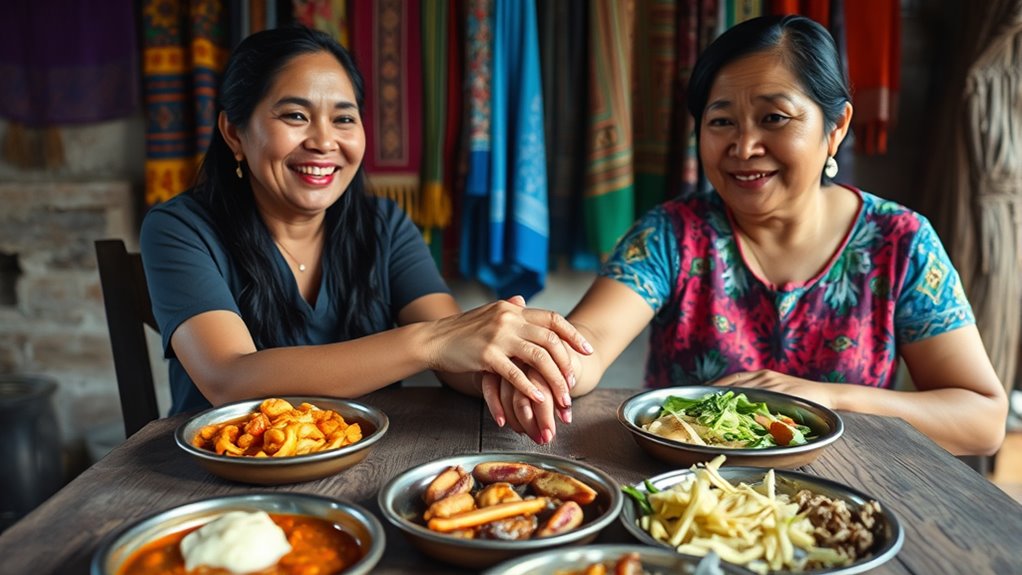Utang na loob is an essential part of Filipina relationships. It’s about gratitude and the obligation to repay kindness, which can deepen bonds or create pressure. This cultural concept originates from mutual aid practices and has evolved over time, impacting family ties and community dynamics. While it fosters loyalty, it can also lead to guilt or anxiety if expectations aren’t met. Understanding these nuances can enrich your perspective on these relationships, and there’s much more to explore.
Key Takeaways
- Utang na loob signifies a deep sense of gratitude and obligation, shaping relationships within Filipina culture.
- It emphasizes reciprocity, where favors are expected to be repaid, often with added interest.
- The concept fosters strong family ties, reinforcing loyalty and mutual support during challenges.
- Emotional burdens can arise when individuals feel pressured to fulfill expectations, leading to anxiety.
- Open communication is crucial to navigate the complexities of utang na loob and prevent misunderstandings.
The Concept of Utang Na Loob in Filipino Culture

Utang na loob, which translates to “debt of gratitude,” is a cornerstone of Filipino culture that shapes interpersonal relationships and community dynamics.
This concept emphasizes a deep sense of obligation and gratitude towards those who’ve supported you. It strengthens family bonds and fosters loyalty, creating a web of responsibility among relatives.
However, it can also lead to emotional burdens and stress, as you might feel overwhelmed by the need to repay perceived debts. While this motivates you to reciprocate kindness, it can also shape your self-identity, tying your worth to your ability to fulfill obligations.
The weight of utang na loob can create emotional stress, intertwining self-worth with the need to repay kindness.
Ultimately, utang na loob influences social interactions, encouraging harmony and interconnectedness within communities.
Historical Roots and Evolution of Utang Na Loob

While exploring the historical roots of utang na loob, it’s essential to recognize its deep-seated origins in pre-colonial Filipino societies, where community support and mutual aid were fundamental for survival.
The arrival of Spanish colonizers in the 16th century reshaped these values, embedding Catholic ideals of charity and gratitude into the culture. This colonization established a social hierarchy, making utang na loob synonymous with loyalty and obedience to those in power.
Over time, it transformed from mere indebtedness into social currency, critical for maintaining relationships. As it became ingrained in daily interactions, the concept evolved to imply long-term obligations, reinforcing cycles of reciprocity.
Today, utang na loob remains a cornerstone of Filipino identity, influencing interpersonal connections across diverse social landscapes.
Emotional and Psychological Impacts on Relationships

Understanding the emotional and psychological impacts of utang na loob on relationships is vital for maneuvering the complexities of Filipino social dynamics.
You might feel guilt or anxiety when you can’t repay obligations, which can strain your mental health. This emotional indebtedness often creates stress, making you feel trapped in a cycle of obligation.
When family members can’t meet these expectations, tension may arise, leading to feelings of inadequacy. The pressure to fulfill emotional debts can compromise personal relationships, fostering resentment instead of closeness.
You might develop avoidance or denial as coping mechanisms, further harming your emotional well-being. Open communication about these emotional debts is significant to avoid misunderstandings that can erode trust and connection within your relationships.
Social Dynamics and Reciprocity in Filipina Relationships

Maneuvering the complexities of Filipina relationships involves recognizing how social dynamics and reciprocity shape interactions.
At the heart of these connections is “Utang na Loob,” a debt of gratitude that fosters mutual obligations. This concept encourages you to repay favors with interest, reinforcing responsibilities within familial and social ties.
The respect for elders and the practice of “pakikisama” highlight the importance of getting along, ensuring harmony among peers.
You’ll notice bilateral relationships thrive on shared expectations, where social acceptance is often tied to the quality of personal connections.
Understanding these dynamics not only strengthens your bonds but also nurtures a sense of community, promoting stability across various social classes.
Embrace these values to deepen your relationships.
Economic Implications of Utang Na Loob

The economic implications of “Utang na Loob” extend far beyond personal relationships, shaping how financial decisions are made within families and communities. This debt of gratitude influences your view of financial obligations, often prioritizing family needs over personal goals.
You might find that resource allocation favors helping others, leading to shared savings and spending habits. The pressure to repay kindness can also create financial stress if not managed well.
In times of crisis, strong family ties fostered by Utang na Loob can provide vital support, helping you navigate economic challenges. This cultural practice encourages investment choices that benefit your family, shaping your career path and delaying personal financial achievements for the sake of communal welfare.
Cultural Adaptation and Modern Perspectives

How does *utang na loob* adapt in a rapidly changing world? As Filipinos navigate globalization, this cultural value faces new challenges.
While it emphasizes gratitude and familial duty, younger generations often view it through a modern lens, balancing personal autonomy with traditional expectations.
In Filipino-American communities, *utang na loob* remains essential for cultural identity, fostering strong social ties.
However, it can also lead to emotional burdens, as individuals feel pressured to reciprocate familial sacrifices.
Despite these complexities, the essence of *utang na loob* encourages mutual support and community building, helping maintain cohesion.
As you observe these shifts, you’ll see how this value continues to evolve while shaping social norms within Filipino communities worldwide.
Balancing Utang Na Loob With Personal Autonomy

While maneuvering through the complexities of *utang na loob*, you may find it challenging to maintain your personal autonomy. To strike a balance, start by defining your personal financial goals and creating a budget that respects both your obligations and aspirations.
Open communication with family members about financial priorities can help manage expectations and reduce pressure. Educating relatives about your challenges abroad fosters understanding and lessens the weight of moral debt.
Utilize financial tools to simplify management, ensuring you prioritize your needs without neglecting familial ties. Self-reflection on your boundaries is essential.
Frequently Asked Questions
How Does Utang Na Loob Affect Workplace Relationships in the Philippines?
Utang na loob greatly shapes workplace relationships in the Philippines.
When you receive support or opportunities, you often feel a strong obligation to reciprocate, fostering loyalty and commitment. This sense of gratitude can strengthen bonds with colleagues, enhancing teamwork and collaboration.
You’ll likely go above and beyond in your role, leading to improved performance and job satisfaction. Embracing this value can create a supportive work environment that benefits everyone involved.
Can Utang Na Loob Lead to Toxic Relationships?
Yes, “utang na loob” can definitely lead to toxic relationships.
You might feel pressured to repay favors or kindness, which can create an imbalance. When you can’t refuse requests without guilt, it erodes your personal agency.
This obligation can weigh heavily on you, leading to resentment and mistrust. Over time, the emotional fallout can damage relationships, turning what was once a bond into a source of stress and conflict.
What Are Some Examples of Utang Na Loob in Daily Life?
You might see “utang na loob” in daily life through small acts of kindness, like helping a neighbor with chores after they’ve assisted you before.
It can show up when you feel compelled to support a friend who’s always been there for you, or when you attend family gatherings to honor sacrifices your parents made.
Even sharing resources, like time or money, reflects this deep-rooted sense of gratitude and obligation in your interactions.
How Do Different Regions in the Philippines Interpret Utang Na Loob?
In the Philippines, 70% of Filipinos believe that utang na loob is essential for community cohesion.
You’ll find that interpretations vary by region. In Luzon and Metro Manila, it often revolves around familial duties and urban connections.
Meanwhile, in the Visayas and Mindanao, it emphasizes deep familial ties and community support.
These regional nuances shape how people express gratitude, with each area reflecting its unique cultural identity and traditions.
Are There Contemporary Movements Challenging Utang Na Loob?
Yes, there are contemporary movements challenging “utang na loob.”
You’ll notice that many young people prioritize personal aspirations over traditional obligations. They seek independence, expressing frustration over the pressure to repay parental sacrifices.
This shift encourages a balance between gratitude and personal autonomy. Social media amplifies these discussions, allowing individuals to share experiences and critique the oppressive aspects of these cultural norms, fostering healthier family dynamics and promoting self-empowerment.
Conclusion
Understanding “utang na loob” isn’t just about acknowledging debts; it’s about maneuvering the intricate web of relationships that shape your life. As you reflect on your own connections, you might find yourself questioning: how does this concept play out in your interactions? Balancing gratitude with autonomy can be tricky, but it’s essential. So, as you move forward, consider how you can honor these ties while still carving out your own path. What will you choose?









